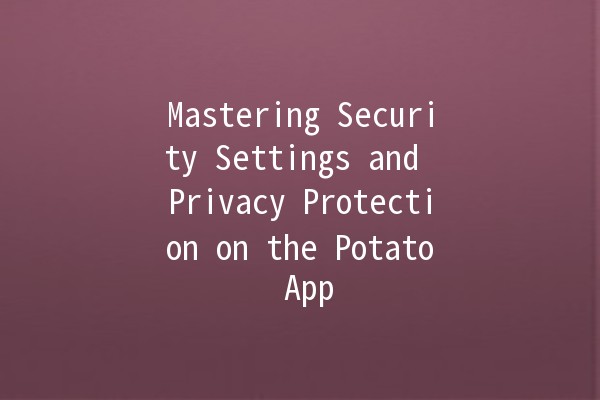In an age where digital privacy is paramount, managing personal data securely is more crucial than ever. The Potato app, a popular tool among users for its unique features, provides various settings to help safeguard your information. This article will explore practical steps to enhance your security and privacy while using the Potato app. Here you'll find five actionable tips that not only improve security but also boost productivity.
Understanding the Importance of Security and Privacy
Before diving into the specifics of the Potato app, it’s essential to recognize why security and privacy matter. With increasing incidents of data breaches and unauthorized access, protecting personal information has become a top priority. Since many users interact with sensitive data daily, ensuring the security settings of any application, including Potato, is a necessary step.
The Impact of Data Breaches
Data breaches can lead to identity theft, financial loss, and reputational damage. Hackers continuously look for vulnerabilities in apps to exploit user information. By taking the reins of your privacy settings, you not only protect your data but also contribute to a safer online environment for everyone.
Tip #1: Enable TwoFactor Authentication (2FA)
TwoFactor Authentication (2FA) adds an extra layer of security to your Potato app. By requiring two forms of verification, you greatly decrease the likelihood of unauthorized access. Here’s how to enable this feature:

Practical Example:
After enabling 2FA, when you log into your account from an unfamiliar device, you will receive a code via SMS or an authentication app. Without this code, potential intruders cannot gain access, thus enhancing your overall security.
Tip #2: Keep Your App Updated
Regularly updating any application is essential in maintaining security. The Potato app developers consistently roll out updates to patch security vulnerabilities and enhance features. Here's how updates can protect your privacy:
Install Updates Promptly: Activating automatic updates ensures you are always using the latest version.
Check Release Notes: Pay attention to update notes to understand which security fixes were implemented.
Practical Example:
For instance, an update might resolve a security flaw that hackers could exploit. By neglecting updates, users leave their accounts exposed to potential risks.
Tip #3: Review Privacy Settings
Navigating through the privacy settings of the Potato app can yield significant improvements in how your data is managed. Here’s a stepbystep guide to review and modify your settings:
Practical Example:
By turning off location sharing, you prevent the Potato app from accessing your geographical data unless required, thus enhancing your privacy.
Tip #4: Utilize Secure WiFi Connections
Using secure WiFi connections is a critical factor in keeping your data safe while using the Potato app. Public WiFi networks can often be unsecured, allowing hackers to intercept data. Here’s how to ensure your connections are secure:
Connect to Trusted Networks: Only use trusted WiFi connections. Avoid public networks for accessing sensitive information.
Use a VPN: If you must use a public network, consider using a Virtual Private Network (VPN) to encrypt your data.
Practical Example:
With a VPN, even if you connect to a public WiFi, your data will be encrypted, making it difficult for attackers to access personal information transmitted through the Potato app.
Tip #5: Monitor Account Activity
Regularly monitoring your account activity can alert you to any suspicious actions that may indicate unauthorized access. The Potato app allows users to view login history and recent activity logs. Here’s how to keep track of your account:
Practical Example:
Suppose you see a login from an unfamiliar device. By recognizing this event early, you can take swift action, like changing your password and enabling 2FA.
Common Questions About Security and Privacy on the Potato App
If you suspect your account has been compromised, immediately change your password using a strong combination of letters, numbers, and special characters. Enable 2FA if it wasn't already and check your account for any unauthorized changes or transactions. Reach out to Potato app support for further assistance.
The Potato app adheres to strict privacy policies that dictate how your personal data is collected, used, and stored. They also give users control over their datasharing preferences, allowing you to switch off any data collection features that you're uncomfortable with.
Absolutely! Ensure that your mobile device has a secure passcode, and only download the Potato app from trusted sources like the Apple App Store or Google Play Store. Regularly update your device operating system and the app to keep security features up to date.
Phishing attempts often come in the form of emails or text messages pretending to be from the Potato app, asking for your login credentials. Always verify the sender's email address and avoid clicking on suspicious links. When in doubt, contact support through official channels.
Regularly changing your password is a good practice, ideally every 36 months. It's best to create complex passwords that are difficult to guess, mixing upper and lower case letters, numbers, and symbols.
Users have the option to delete their data within the Potato app settings. Simply navigate to account settings and look for the option to remove your account or data permanently.
By implementing these practical steps, you can significantly improve your security and privacy while using the Potato app. Remember, an informed user is a safer user, so take time to evaluate your settings and stay updated on best practices.